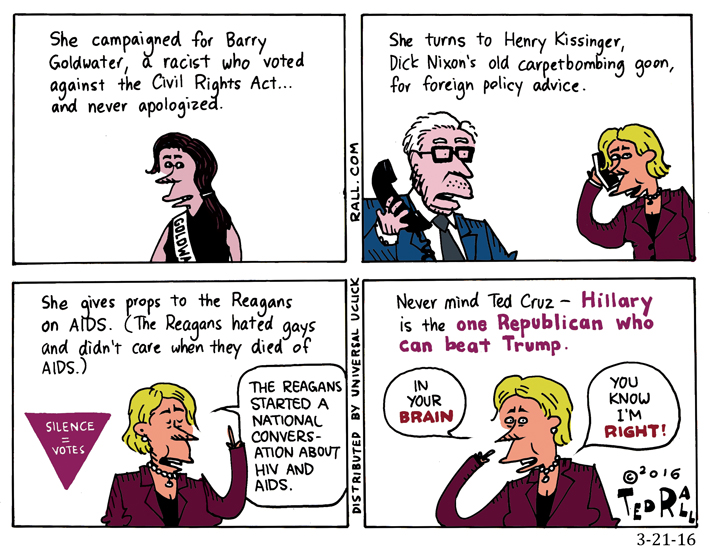
Your boss can’t fire you because of the color of your skin. He can’t get rid of you because he doesn’t like your religion. Federal law protects you against employment discrimination based on your sex, race, pregnancy status, sexual orientation, gender identity, national origin, disability, genetic information or (if you are over 40) age.
Should he be able to deprive you of your ability to pay your rent because you’re a Democrat? Or a Republican? Of course not—yet he can.
It’s time to add another protected class to Title VII of the Civil Rights Act of 1964: political expression.
Every year, especially during election years, American employers fire, demote and/or retaliate against loyal workers because they disagree with their constitutionally-guaranteed right to hold a political opinion. While a company may well have a reasonable interest in keeping politics out of the workplace—the owner of a restaurant might not want a waiter to engage in a political debate with their customer, for example—many employees get let go despite never having expressed a political opinion on the job. In most states, they can’t sue.
Going after a person over their politics is unfair. But it’s a much bigger problem than a violation of common decency. Because threatening a person’s livelihood over their opinions has a chilling effect on the expression of other workers as well, allowing such thuggish behavior stifles the speech necessary for a vibrant political system and is thus profoundly undemocratic.
“Most important,” a 2022 New York Times editorial opined, “freedom of speech is the bedrock of democratic self-government. If people feel free to express their views in their communities, the democratic process can respond to and resolve competing ideas. Ideas that go unchallenged by opposing views risk becoming weak and brittle rather than being strengthened by tough scrutiny.” Most Americans, however, do not feel that they live in a Land of the Free. Only a third of voters said they felt free to express their political views freely, according to a contemporaneous poll.
Nowhere is speech circumscribed more than at work—unless you’re a government employee, where you’re protected by the First Amendment, or you live in one of the handful of states that protect private-sector workers who express political opinions. Private employers are authoritarian dictatorships where it’s best to keep your views to yourself. Your boss’ harsh governance should end at the end of your work shift.
Yet it does not.
Employment discrimination in response to political expression is not limited to victims with fringe political views, like the pizza-shop and hot-dog-joint workers who got fired after online sleuths discovered that they had attended a far-right white-nationalist rally in Charlottesville in 2017, or the white-collar workers canned for their presence at the January 6th Capitol riot. To be clear, however, there was no evidence that the doxxed-and-dumped employees in these situations had expressed their views while on the job. They should not have been let go.
Citizens with vanilla affiliations within the duopoly are targeted too.
An Alabama woman was famously fired from her job at an insulation company in 2004 for being a Democrat, and more specifically the Kerry-Edwards bumpersticker on her car, which she parked in the employee parking lot. (Her boss, a Bush supporter, had passed out GOP flyers to his workers.) She had no right to sue.
In 2022 a woman who co-founded a non-profit organization that provides financial stipends for Congressional interns was fired by her own board after it learned she was a conservative Republican. She filed a long-shot federal lawsuit, which is pending.
More recently, antiwar activists who oppose Israel’s war against Gaza have found themselves the victims of retaliation. People have been fired for personal social-media posts supporting the Palestinians. Pro-Palestine college students have been doxxed, suspended, expelled and blacklisted by prospective employers. Google fired 50 employees for staging a protest against the company’s contracts with Israeli tech firms; the company said they lost their jobs for causing a disruption rather than their opinions. A baker’s dozen of federal judges went so far as to declare that they wouldn’t hire any student who graduated from Columbia University—my alma mater and ground zero for a wave of campus encampment protests—regardless of their views, or lack thereof, about the Israel-Hamas War.
Corporations routinely discriminate based on politics. A 2019 study in the Journal of Applied Psychology found that employers are less likely to hire a job applicant when they become aware that they favor different parties. And workers are well aware that they face political discrimination. A 2020 Cato Institute/YouGov poll found that 32% of workers were “personally are worried about missing out on career opportunities or losing their job if their political opinions became known.” Only 32%?
We have a choice. We can build a politically permissive society where a wide range of views and opinions may be freely expressed (with exceptions for defamation or calling for specific violence) without fear of being discriminated against, understanding that we will frequently take offense at what is being said. Or we can continue to push politics underground, keeping our views so secret that some “shy” voters won’t even admit their party affiliation to pollsters. We may feel more comfortable in a seemingly politics-free zone but, as the Times editorial argued above, censorship and self-censorship will encourage the spreading of outlandish, stupid and demonstrably wrong ideas that occasionally become the law of the land.
(Ted Rall (Twitter: @tedrall), the political cartoonist, columnist and graphic novelist, co-hosts the left-vs-right DMZ America podcast with fellow cartoonist Scott Stantis. You can support Ted’s hard-hitting political cartoons and columns and see his work first by sponsoring his work on Patreon.)

